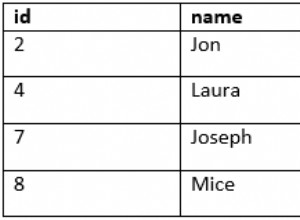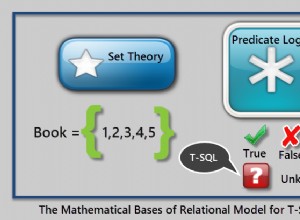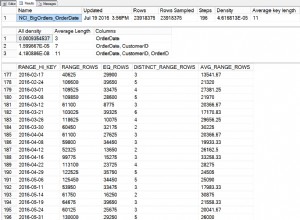Utilisez pg_depend . Exemple :
create table master (id int primary key);
create table detail_1 (id int, master_id int references master(id) on delete restrict);
create table detail_2 (id int, master_id int references master(id) on delete cascade);
select pg_describe_object(classid, objid, objsubid)
from pg_depend
where refobjid = 'master'::regclass and deptype = 'n';
pg_describe_object
------------------------------------------------------
constraint detail_1_master_id_fkey on table detail_1
constraint detail_2_master_id_fkey on table detail_2
(2 rows)
deptype = 'n' signifie :
DEPENDENCY NORMAL - Une relation normale entre des objets créés séparément. L'objet dépendant peut être supprimé sans affecter l'objet référencé. L'objet référencé ne peut être supprimé qu'en spécifiant CASCADE, auquel cas l'objet dépendant est également supprimé.
Utilisez pg_get_constraintdef() pour obtenir les définitions de contraintes :
select
pg_describe_object(classid, objid, objsubid),
pg_get_constraintdef(objid)
from pg_depend
where refobjid = 'master'::regclass and deptype = 'n';
pg_describe_object | pg_get_constraintdef
------------------------------------------------------+------------------------------------------------------------------
constraint detail_1_master_id_fkey on table detail_1 | FOREIGN KEY (master_id) REFERENCES master(id) ON DELETE RESTRICT
constraint detail_2_master_id_fkey on table detail_2 | FOREIGN KEY (master_id) REFERENCES master(id) ON DELETE CASCADE
(2 rows)
Pour trouver la chaîne complète des dépendances en cascade, nous devons utiliser la récursivité et consulter le catalogue pg_constraint pour obtenir id d'une table dépendante.
with recursive chain as (
select classid, objid, objsubid, conrelid
from pg_depend d
join pg_constraint c on c.oid = objid
where refobjid = 'the_table'::regclass and deptype = 'n'
union all
select d.classid, d.objid, d.objsubid, c.conrelid
from pg_depend d
join pg_constraint c on c.oid = objid
join chain on d.refobjid = chain.conrelid and d.deptype = 'n'
)
select pg_describe_object(classid, objid, objsubid), pg_get_constraintdef(objid)
from chain;




